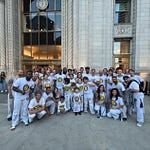🔥Welcome to Volume #00096!🔥
I’m Christian Champ. This is ☯️The Middle Way Newsletter ☯️. It is a place where I write, explore, share, and invite you along for the journey.
If you enjoy the newsletter, please share it with your friends.
😎Why We Want to Find the Right People at the Right Place at the Right Time 🕑
Listening to Martin Scorsese getting interviewed by Jeffery Katzenberg, the good vibes flowed.
We came together to celebrate a successful investment exit, bringing together the principals, the management team, the investors, and the board.
All around the table echoed the enjoyment of coming together and celebrating.
I sat at the table feeling lucky to have been involved. A fortuitous cookout at a buddy's house led me here.
Two brothers formed a partnership to buy small companies and wanted to find a board member. Another buddy, who helped inspire their venture by doing the same thing, directed them to me.
Remember that guy from the cookout? Well, you need to talk to him.
A couple of conversations later and I ran into the Right People.
I ended up on the board, coaching our management teams and helping provide strategic advice.
Fast forward half a decade, we purchased a distribution business, created our brand of products, and sold it for a multiple of the purchase price.
We hit the trifecta of the Right People, the Right Place, and the Right Time.
The Right People
Everything starts with the right people.
Lucky for us, the right people are easy to find, but it takes effort. We need to search for and put in the time.
We know them when we find them because they fill us with energy and excitement. We find them in the right mentors, coaches, teachers, friends, and colleagues.
The right people point us to aliveness.
Life becomes more meaningful as we band together to create. We share goals and values, have a similar compass, and know the direction we want to head. Life is more enjoyable because we push each other and do hard things together. We lift each other whenever we need a hand and support our success when flying high.
Running into the right people leads to continuous waves of additional "right people.”
We know the right people when we feel aliveness, possibilities, potential, inspiration, and the crispness of life.
The Right Place
Finding the right place is tougher. The right people tend to come first.
The way we find the right place is to start with where we are right now. How can we mold it into the right place?
If we can't mold it, we need to exit.
The challenge with the right place is that we must continue creating the right place; the mission never ends. We need to ride the bumps and keep building culture and instilling values.
The right place becomes generative. Like the right people, it makes us feel alive and inspired. We show up with a hop in our step because we help create something exciting. The right place pushes us to the edges and tests our metal.
Our distribution business felt right, but adding our products changed it into the right place. Getting the products correct tested us. We went to uncharted territory. That subtle move led to tremendous positive change for ourselves and the business.
The right place is about the mission and everyone stepping into it.
The right place many times is a jujitsu move away. We need to run experiments to unlock it.
The Right Time
Finding the right time is a tricky prospect.
If you arrive early to a rocket ship and things take off, you get the ride of your life. If you show up just before a train wreck, it is the opposite experience. If you show up after the rocket takes off, the experience depends on where you sit on the rocket.
Timing and luck run together, but we can make our own timing and luck.
Timing is the last of the trifecta because it is the hardest to predict and we have the least amount of agency over.
The right timing tends to follow when the right people get together at the right place, but we won’t know how long to wait.
We can redefine success as being with the right people at the right place, sitting there until the timing hits. We wait as long as it remains the right people and place. If it changes, we exit.
Setting Ourselves Up for Finding the Three Rights
We want the Warren Buffet investment situations where heads we win and tails, we don't lose.
That is what happens when we surround ourselves with the right people.
When the world comes together and hits the right place and time, we find the best moments in life. Think back to your memories that stand out. How many had the right people, the right place, and the right time?
Life is great even when we miss timing if we hit with the right people and place.
We must look around and ensure we sit with the right people at the right table.
📓Things to Think About📓
HBR on Simple Writing Paying Off
I realized one day that all my writing was garbage. It mixed run-on sentences with verbose phrases and plenty of cliches.
When I started managing a team of analysts, my goal included getting everyone to speak and write clearly and minimally. This is especially important when recommending investments but applies equally when conveying a company’s performance in written or spoken form.
I made sure folks called me out if I got caught violating any of those principles.
The article gives many reasons to write clearly, but his five takeaways are the key points.
Fewer ads: Use strong verbs and nouns. Adverbs and adjectives often disrupt clarity, like coughing at the opera.
Break it down: Split up beefy thoughts and sentences. As a pro once said, “The period never comes soon enough.”
Cut caveats: Every argument has exceptions. Every topic demands context. Still, unless you’re specifically citing disclaimers, minimize the fig leaves of hedging.
Clean out residue: With each new draft, you’ll refine, reinforce, reiterate, and restate. Go back and strip out extraneous wording.
Keep it short: Don’t write more than your audience needs.
Cedric Chin offers a piece noting that Focus is Saying No to Good Ideas
Saying no to good ideas sounds obvious but is tough to do.
One of the more interesting things about focus is that you can see it in good operators, if you know how to look. But it happens to also be really difficult to do.
Cedric breaks down Cohort Based Courses, which he ran at his university.
Notice that I’m not saying that CBCs are a bad business! I’m saying that they have tradeoffs, and those tradeoffs don’t match my business goals. Yes, I know that CBCs are the quickest way to significant product revenue in the short term (after consulting, perhaps). I know many entrepreneurs who run good CBC businesses; they’re perfectly happy and fulfilled doing what they do. I also happen to know that I’ll be very emotionally satisfied if I go down this route. But I want to build recurring revenue over the long term, and CBCs aren’t the ideal path to take for that.
Everything has trade-offs and cost-benefits; we only have so much time and energy.
Ultimately, “focus is saying no to good ideas” takes aim at the lies we tell ourselves as business operators: that we fear missing out on everything that is good, that we think much of what is good is worth doing, and that we think that somehow chasing multiple good things at the same time is doable.
📕Books to Read📕
One Room Schoolhouse: Education Reimagined by Salman Khan (Goodreads)
The founder of Khan academy shares his story of how and why he created Khan Academy. As someone trying to help people, including my kids and myself, to learn better, this book offered many solid ideas.
I’m not a fan of the school system but I love lifelong learning. Khan offers many ideas on how to learn better and keep learning no matter one’s age.
“Personal responsibility is not only undervalued but actually discouraged by the standard classroom model, with its enforced passivity and rigid boundaries of curriculum and time. Denied the opportunity to make even the most basic decisions about how and what they will learn, students stop short of full commitment.”
“At every moment, we are both students and teachers; we learn by studying, but we also learn by helping others, by sharing and explaining what we know.”
- Salman Kahn
Portability --> do it in different contexts and at different times. Internet smashes on this front.
Self-pacing --> student can speed up or slow down when necessary
Active Stance Towards Learning --> Take things in and figure things in. Know where they stand and what gaps they need to fill.
Question Customs --> He never went to lectures at MIT and instead doubled up his class load and his majors
Swiss Cheese Learning --> DOESNT WORK you need to fill in the holes and be proficient at what matters and key ideas/concepts
How Much Homework --> real question is why homework in the first place?? Is it because not enough learning in the day? How to fix that?
Broadcast lectures don't work
Teachers as coaches that understand what the students need to work on and help push them and celebrate their success
Kids should progress at their own pace --> GOAL IS CONCEPTUAL UNDERSTANDING
Give kids remediation where they need it
Leveling up slow students on concepts led to them leap-frogging their non-slow peers
Embrace Uncertainty
His ideas for education include:
First, I would eliminate letter grades altogether. In a system based on mastery learning, there is no need and no place for them. Students advance only when they demonstrate clear proficiency with a concept, as measured either by the ten-in-a-row heuristic or some future refinement of it. Since no one is pushed ahead (or left behind) until proficiency is reached, the only possible grade would be an A. To paraphrase Garrison Keillor, all the kids would be way above average, so grades would be pointless.
Instead, I would propose, as the centerpieces of student appraisal, two things: a running, multiyear narrative not only of what a student has learned but how she learned it; and a portfolio of a student's creative work.
This brings me to the idea of the "creative portfolio" as a central part of a student's "transcript." Everyone is beginning to recognize that curiosity and creativity are more important attributes than a mere facility for a particular subject; yet except for narrowly defined art schools, few institutions even consider an applicant's creative output. This is doubly wrong. First, it implies that only "art" is creative-a view that is provincial and limiting. Science, engineering, and entrepreneurship are equally creative. Second, if we fail to take a serious look at what students have created on their own, above and beyond lessons and tests, we miss an opportunity to appreciate what is truly special about them. More than any data, grades, or assessment, someone's actual creative product is the best testament of his or her ability to create from scratch, to make a solution out of an open-ended problem.
🎧Things to Listen, See, and Watch 🎧
The Long Now Foundation (Stewart Brand and Kevin Kelly) host Jonathan Haidt to talk about democracy in the next cycle
2014 college students began to call words violence and object to speakers and conversations
A culture of fear and attack followed in 2015
Tech and social media created social death, which is what the ancients used… they either killed you or exiled you
Both parties are driven to these extremes, with the Far Right losing the Burke tradition of wisdom and the left becoming more and more illiberal
We are losing the freedom of speech, rule of law, and due process
Polarization is fragmenting us and making people afraid of each other (social media driven)
Teen mental health issues continue to increase, mainly driven by teenage girls posting photos and getting responses that drive the mental health issues
We made Gen Z weak by over-protecting them, and then they went through social media
Trigger warnings divided the world into good and evil, oppressors and oppressed, and glorified girls being victims (50% increase in mental health issues)
Free-range childhood is a solution to this… kids need to learn, learn, learn from play, play, play
There was a long crime wave from the 1960s to the 1990s, and as the crime wave receded, perversely we stopped letting kids play outside by themselves to terrible results
The left has adopted a set of policies that are crippling its kids… all organizations are falling into micro battles (the right has its own issues, including a lack of critical thinking)
Video games are synchronous communal team play, while girls on social media doesn’t include those positive attributes (though boys’ mental health has also declined)
“There's an internet meme that captures it… Hard times make strong men strong men which makes for good times. Good times make weak men, and weak men make hard times, so there are cycles to history.”
Cycles can run 20 to 100 years, and the near term doesn’t look great to Jonathan
Kevin hopes that the technological learning tools and AI can make the near term one of the most amazing moments to be alive, but our decisions from here will decide the outcomes
We need shared meaning… we need the culture war to get away from our children
Jonathan leaves us with Joseph Campbell’s quote We cannot cure the world of sorrows, but we can choose to live in joy.


💣Words of Wisdom💣
"All things are meltable, and replaceable. Not at this moment, but soon enough, we are lambs and we are leaves, and we are stars, and the shining, mysterious pond water itself." (Mary Oliver, Upstream)
"Every idea can be condensed to its essential meaning: What do you need people to hear? What do you want people to do? What do you want people to remember?" (Rose Fass, The Chocolate Conversation)
"Working hard is important. But more effort does not necessarily yield more results. “Less but better” does." (Greg McKeown, Essentialism)
"Humanity gave voice to the questions that have animated religion and philosophy ever since: What does it mean to be human? What matters in a life? What matters in a death? How to be of service to each other and the world?" (Krista Tippett, Becoming Wise)
"This means it isn’t a final victory we should seek but simple, humble progress: the never-ending pleasure of moving in the right direction. Nobody wins the status game. They’re not supposed to. The meaning of life is not to win, it’s to play." (Will Storr, The Status Game)
"Yuichi Shoda demonstrated that, in fact, there is something consistent about our identity it just wasn't the kind of consistency anyone expected: we are consistent within a given context." (Todd Rose, The End of Average)
So the only way on earth to influence other people is to talk about what they want and show them how to get it. - Dale Carnegie, How to Win Friends and Influence People
"Frequency keeps the pressure off." (Jocelyn K. Glei, Manage Your Day-to-Day)
"There is now little question that how one uses one's attention, moment to moment, largely determines what kind of person one becomes. Our minds-and lives-are largely shaped by how we use them." (Sam Harris, Waking Up)
"I have never encountered an executive who remains effective while tackling more than two tasks at a time." (Peter F. Drucker, The Effective Executive)
🙏Thanks for Reading🙏
Are you sitting at the right tables with the right people? How do you add more of them to your life?
How do you ensure that you show up as the right person for other folks?
Any thoughts or comments, please share!
Namaste,
Christian
Getting dressed up and celebrating a successful investment













Share this post